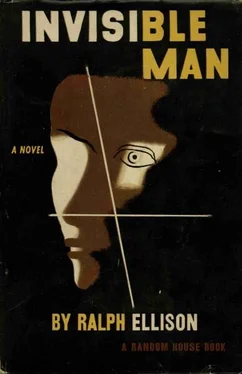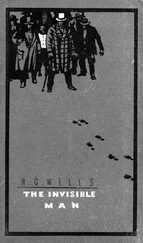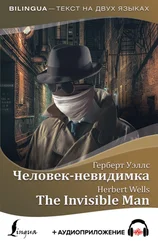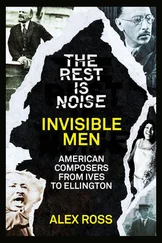Ralph Ellison - Invisible man
Здесь есть возможность читать онлайн «Ralph Ellison - Invisible man» весь текст электронной книги совершенно бесплатно (целиком полную версию без сокращений). В некоторых случаях можно слушать аудио, скачать через торрент в формате fb2 и присутствует краткое содержание. Год выпуска: 1995, ISBN: 1995, Издательство: Vintage Books, Жанр: Классическая проза, на английском языке. Описание произведения, (предисловие) а так же отзывы посетителей доступны на портале библиотеки ЛибКат.
- Название:Invisible man
- Автор:
- Издательство:Vintage Books
- Жанр:
- Год:1995
- ISBN:9780679732761
- Рейтинг книги:4 / 5. Голосов: 1
-
Избранное:Добавить в избранное
- Отзывы:
-
Ваша оценка:
- 80
- 1
- 2
- 3
- 4
- 5
Invisible man: краткое содержание, описание и аннотация
Предлагаем к чтению аннотацию, описание, краткое содержание или предисловие (зависит от того, что написал сам автор книги «Invisible man»). Если вы не нашли необходимую информацию о книге — напишите в комментариях, мы постараемся отыскать её.
The Waste Land,
Invisible man — читать онлайн бесплатно полную книгу (весь текст) целиком
Ниже представлен текст книги, разбитый по страницам. Система сохранения места последней прочитанной страницы, позволяет с удобством читать онлайн бесплатно книгу «Invisible man», без необходимости каждый раз заново искать на чём Вы остановились. Поставьте закладку, и сможете в любой момент перейти на страницу, на которой закончили чтение.
Интервал:
Закладка:
"Hush, goddamit," one of the faces ordered. "We're trying to get you started again. Now shut up!"
The voice throbbed with icy authority and I quieted and tried to contain the pain. I discovered now that my head was encircled by a piece of cold metal like the iron cap worn by the occupant of an electric chair. I tried unsuccessfully to struggle, to cry out. But the people were so remote, the pain so immediate. A faced moved in and out of the circle of lights, peering for a moment, then disappeared. A freckled, red-haired woman with gold nose-glasses appeared; then a man with a circular mirror attached to his forehead -- a doctor. Yes, he was a doctor and the women were nurses; it was coming clear. I was in a hospital. They would care for me. It was all geared toward the easing of pain. I felt thankful.
I tried to remember how I'd gotten here, but nothing came. My mind was blank, as though I had just begun to live. When the next face appeared I saw the eyes behind the thick glasses blinking as though noticing me for the first time.
"You're all right, boy. You're okay. You just be patient," said the voice, hollow with profound detachment.
I seemed to go away; the lights receded like a tail-light racing down a dark country road. I couldn't follow. A sharp pain stabbed my shoulder. I twisted about on my back, fighting something I couldn't see. Then after a while my vision cleared.
Now a man sitting with his back to me, manipulating dials on a panel. I wanted to call him, but the Fifth Symphony rhythm racked me, and he seemed too serene and too far away. Bright metal bars were between us and when I strained my neck around I discovered that I was not lying on an operating table but in a kind of glass and nickel box, the lid of which was propped open. Why was I here?
"Doctor! Doctor!" I called.
No answer. Perhaps he hadn't heard, I thought, calling again and feeling the stabbing pulses of the machine again and feeling myself going under and fighting against it and coming up to hear voices carrying on a conversation behind my head. The static sounds became a quiet drone. Strains of music, a Sunday air, drifted from a distance. With closed eyes, barely breathing I warded off the pain. The voices droned harmoniously. Was it a radio I heard -- a phonograph? The vox humana of a hidden organ? If so, what organ and where? I felt warm. Green hedges, dazzling with red wild roses appeared behind my eyes, stretching with a gentle curving to an infinity empty of objects, a limpid blue space. Scenes of a shaded lawn in summer drifted past; I saw a uniformed military band arrayed decorously in concert, each musician with well-oiled hair, heard a sweet-voiced trumpet rendering "The Holy City" as from an echoing distance, buoyed by a choir of muted horns; and above, the mocking obbligato of a mocking bird. I felt giddy. The air seemed to grow thick with fine white gnats, filling my eyes, boiling so thickly that the dark trumpeter breathed them in and expelled them through the bell of his golden horn, a live white cloud mixing with the tones upon the torpid air.
I came back. The voices still droned above me and I disliked them. Why didn't they go away? Smug ones. Oh, doctor, I thought drowsily, did you ever wade in a brook before breakfast? Ever chew on sugar cane? You know, doc, the same fall day I first saw the hounds chasing black men in stripes and chains my grandmother sat with me and sang with twinkling eyes:
"Godamighty made a monkey
Godamighty made a whale
And Godamighty made a 'gator
With hickeys all over his tail ..."
Or you, nurse, did you know that when you strolled in pink organdy and picture hat between the rows of cape jasmine, cooing to your beau in a drawl as thick as sorghum, we little black boys hidden snug in the bushes called out so loud that you daren't hear:
"Did you ever see Miss Margaret boil water?
Man, she hisses a wonderful stream,
Seventeen miles and a quarter,
Man, and you can't see her pot for the steam ..."
But now the music became a distinct wail of female pain. I opened my eyes. Glass and metal floated above me.
"How are you feeling, boy?" a voice said.
A pair of eyes peered down through lenses as thick as the bottom of a Coca-Cola bottle, eyes protruding, luminous and veined, like an old biology specimen preserved in alcohol.
"I don't have enough room," I said angrily.
"Oh, that's a necessary part of the treatment."
"But I need more room," I insisted. "I'm cramped."
"Don't worry about it, boy. You'll get used to it after a while. How is your stomach and head?"
"Stomach?"
"Yes, and your head?"
"I don't know," I said, realizing that I could feel nothing beyond the pressure around my head and the tender surface of my body. Yet my senses seemed to focus sharply.
"I don't feel it," I cried, alarmed.
"Aha! You see! My little gadget will solve everything!" he exploded.
"I don't know," another voice said. "I think I still prefer surgery. And in this case especially, with this, uh ... background, I'm not so sure that I don't believe in the effectiveness of simple prayer."
"Nonsense, from now on do your praying to my little machine. I'll deliver the cure."
"I don't know, but I believe it a mistake to assume that solutions -- cures, that is -- that apply in, uh ... primitive instances, are, uh ... equally effective when more advanced conditions are in question. Suppose it were a New Englander with a Harvard background?"
"Now you're arguing politics," the first voice said banteringly.
"Oh, no, but it is a problem."
I listened with growing uneasiness to the conversation fuzzing away to a whisper. Their simplest words seemed to refer to something else, as did many of the notions that unfurled through my head. I wasn't sure whether they were talking about me or someone else. Some of it sounded like a discussion of history ...
"The machine will produce the results of a prefrontal lobotomy without the negative effects of the knife," the voice said. "You see, instead of severing the prefrontal lobe, a single lobe, that is, we apply pressure in the proper degrees to the major centers of nerve control -- our concept is Gestalt -- and the result is as complete a change of personality as you'll find in your famous fairy-tale cases of criminals transformed into amiable fellows after all that bloody business of a brain operation. And what's more," the voice went on triumphantly, "the patient is both physically and neurally whole."
"But what of his psychology?"
"Absolutely of no importance!" the voice said. "The patient will live as he has to live, and with absolute integrity. Who could ask more? He'll experience no major conflict of motives, and what is even better, society will suffer no traumata on his account."
There was a pause. A pen scratched upon paper. Then, "Why not castration, doctor?" a voice asked waggishly, causing me to start, a pain tearing through me.
"There goes your love of blood again," the first voice laughed. "What's that definition of a surgeon, 'A butcher with a bad conscience'?"
They laughed.
"It's not so funny. It would be more scientific to try to define the case. It has been developing some three hundred years --"
"Define? Hell, man, we know all that."
"Then why don't you try more current?"
"You suggest it?"
"I do, why not?"
"But isn't there a danger ... ?" the voice trailed off.
I heard them move away; a chair scraped. The machine droned, and I knew definitely that they were discussing me and steeled myself for the shocks, but was blasted nevertheless. The pulse came swift and staccato, increasing gradually until I fairly danced between the nodes. My teeth chattered. I closed my eyes and bit my lips to smother my screams. Warm blood filled my mouth. Between my lids I saw a circle of hands and faces, dazzling with light. Some were scribbling upon charts.
Читать дальшеИнтервал:
Закладка:
Похожие книги на «Invisible man»
Представляем Вашему вниманию похожие книги на «Invisible man» списком для выбора. Мы отобрали схожую по названию и смыслу литературу в надежде предоставить читателям больше вариантов отыскать новые, интересные, ещё непрочитанные произведения.
Обсуждение, отзывы о книге «Invisible man» и просто собственные мнения читателей. Оставьте ваши комментарии, напишите, что Вы думаете о произведении, его смысле или главных героях. Укажите что конкретно понравилось, а что нет, и почему Вы так считаете.











